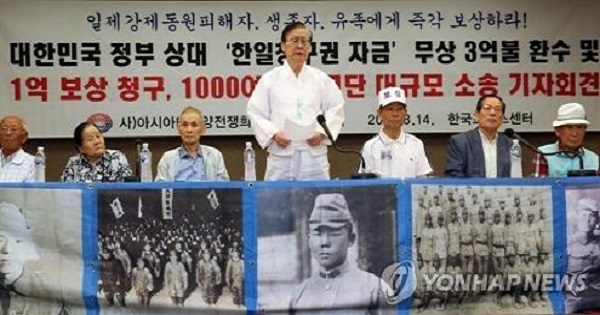A group of forced labor victims and their families on Monday launched a damages suit against the government, seeking to get back funds that Japan provided to South Korea under a 1965 agreement on their diplomatic normalization.
The association of forced labor victims and their bereaved families told a press conference that they filed the suit with the Seoul Central District Court to demand the government give back a $300 million grant in the treaty, under which South Korea and Japan normalized their relations, and 100 million won (around $87,800) each in compensation to four surviving victims of forced labor and the bereaved family members of five other such victims.
At the press conference, the association stated that the funds received from Japan at the time of the deal are tantamount to damages in compensation for the sacrifice of their forefathers. The association suit filing came one day ahead of an anniversary marking the liberation of Korea from Japan's 1910-45 colonial rule.
 |
A group of forced labor victims and their families attend a press conference in Seoul on Aug. 14, 2017, as they launch a damages suit against the government to seek to get back funds that Japan provided to South Korea under a 1965 agreement on their diplomatic normalization. (Yonhap) |
During its negotiation with the Japanese side, the government under then-President Park Chung-hee promised to take responsibility for compensating individual victims of Japan's colonial rule. But it injected the money into the country's economic development, it said.
The association has filed damage suits against the Japanese government and companies, but Japan maintains that individual rights to damages were covered by the 1965 treaty on resolving colonial-era issues.
As the funds were meant for economic cooperation between the countries, the forced labor victims have yet to receive an apology from Japan, they said.
The association said it will recruit as many as 1,000 people to form a group of plaintiffs down the road, launch a nationwide campaign to gain the funds and put former Prime Minister Kim Jong-pil on trial, as he played a major role in completing the deal.
The former prime minister issued a statement through one of his aides, Kim Sang-yoon, that defended the deal. "In the early 1960s, our country was one of the world's poorest and badly needed the funds for its economic reconstruction."
Critics say the South Korean government failed to compensate the forced labor victims and used most of it to build infrastructure, including a steel plant in Pohang and an expressway linking Seoul and Busan.
Kim also said the government and South Korean companies, which had benefited from the use of the funds in the course of the country's economic leap into one of the world's top powerhouses, should come up with measures to support the victims and their bereaved families. (Yonhap)







![[Weekender] Korea's traditional sauce culture gains global recognition](http://res.heraldm.com/phpwas/restmb_idxmake.php?idx=644&simg=/content/image/2024/11/21/20241121050153_0.jpg)
